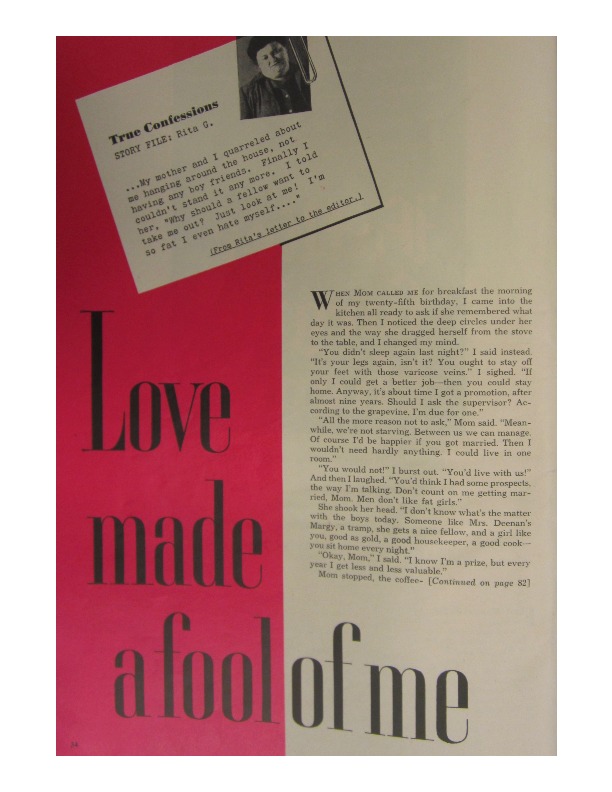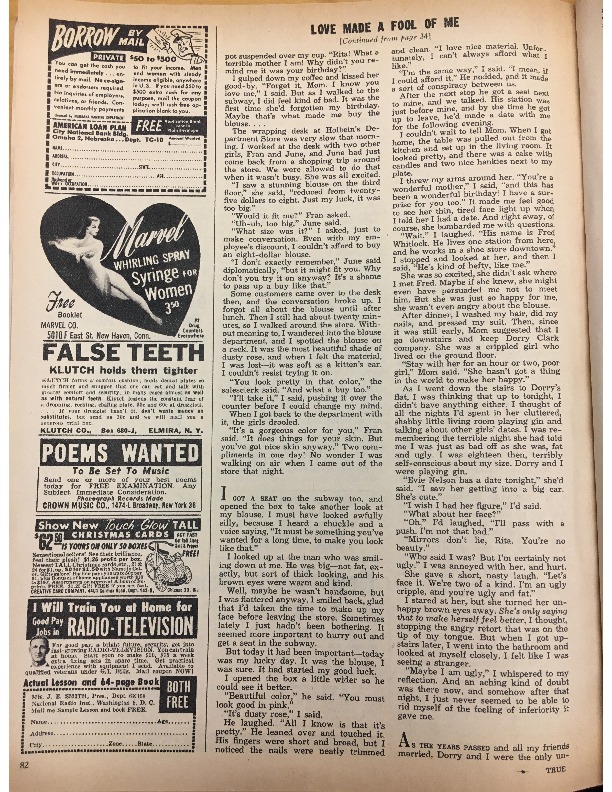The Narrative Core of True Confessions
True Confessions is a romance pulp publication where women submit narratives about romantic or sexual relations with certain men. It allows for a forum of women to meditate on relationships and what they can learn from their personal experiences. In reading these narratives, women are able to identify with one another and form a literary community amongst one another.
These narratives ultimately function as the core of True Confessions. Without the narratives, the magazine would not exist. If I have not already exhausted my point, here is the bottom line: women reading True Confessions are reading it for the narratives. That aspect holds their main focus.
By looking at the specific story "Love made a fool of me," we can learn more about the specific expectations of women in the realm of romance, sex, love, and body agency within those realms.
The story follows the author and main character Rita as she meets a man on the train ride home from work on her birthday. Rita works in retail, denoting that she's a member of the working class. From the beginning of the narrative, we can see that Rita's relationship with men is based mainly on appearance. Rita is not happy with the way she looks, but when she purchases an expensive blouse at the shop in which she works, she is able to captivate Fred's attention.
Throughout this narrative, the relationship between Rita and Fred goes through sinusoidal waves of passion and devotion as well as deception and power imbalances.
A few key moments of intrigue come at the height of Rita and Fred's relationship. The first moment comes when Fred admits to Rita "you're not the only girl I know. So don't go getting ideas" (84). This language shows a lack of caring toward Rita on Fred's part, yet she still replies "do you want to come up to my house for dinner?" (84). Later on that page, Rita notes that "he did all kinds of strange things that I couldn't find an explanation for. [...] He made fun of me too. He said I was too fat. I wasn't pretty. I didn't talk right" (84). Fred exerts abusive masculine power over Rita, and yet she still admits to loving him. When she tells Fred that she lost ten pounds since they met, she says she did it "for you, Fred. Maybe then you'll like me better--" (85). Rita changes her physical appearance in hope that it will please Fred. Not for her health or personal happiness, but because it will win her love, and through that channel she can achieve happiness.
The climax of the story occurs in Fred's automobile. He advances sexually on Rita, and as she begs him to stop, he continues. Clearly distraught by the situation, Rita tries to convince herself that Fred had not assaulted her and that she had wanted him to sexually overpower her. She lies to her mother, saying that he promised marriage. She says that he promised to give her a watch, and this lie compels her to steal a watch from the bathroom at her workplace. She loses her job following this scandal.
By the end of the story, Fred admits that he treated Rita the way he did because of insecurity surrounding his own appearance. They assure each other of their beauty, and Rita notes that after he kisses her, she feels "better and prettier and rich, so very rich--with happiness" (87).
This story--much like every other story within the October 1956 edition of True Confessions--shows a woman ceding her power, her happiness, and her body agency to a man. This narrative fits within the social expectation that women act only within the gaze of men. Rita risks (and ultimately loses) her job to prove that a man loves her. She blames herself for her sexual assault. She still pursues Fred after he verbally and physically abuses her. She cedes her body and her emotional welfare to Fred.
This narrative--positioned toward working class women--sets the standard for behavior. It tells them they cannot find happiness without finding a man. And in order to find a man, they must achieve a certain beauty standard. Their bodies are not their own in this context.
Circling back to the focus of the entire True Confessions magazine, these narratives all depict women in the same way. They always depict women's happiness as a product of a man's intervention. And for this reason, working class women are buying into the narrative that in order to be happy, they must cede agency of their body and emotions to men.

